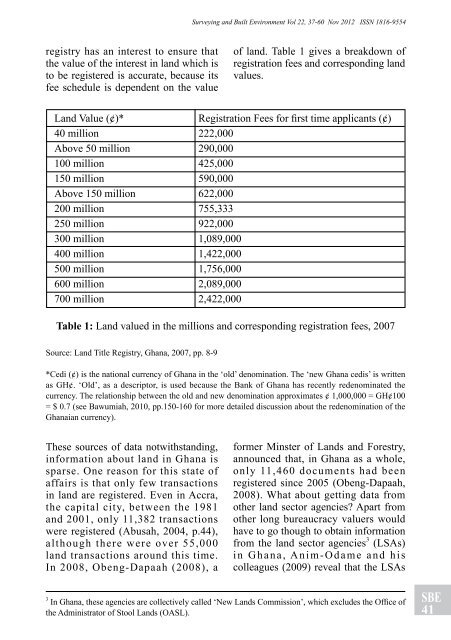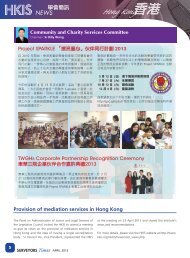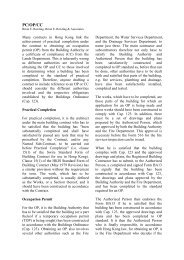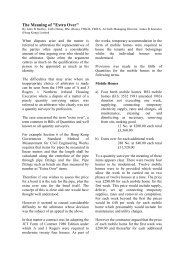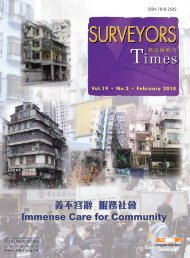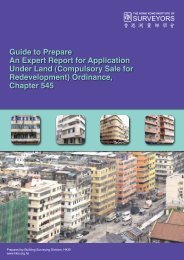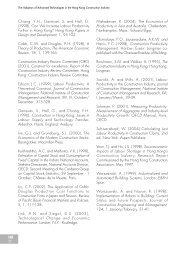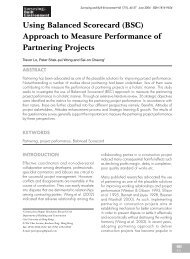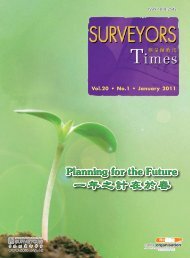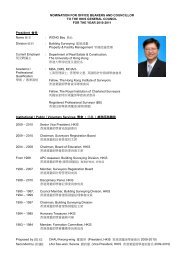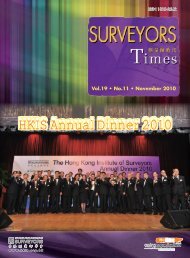Surveying & Built Environment Vol. 22 Issue 1 (December 2012)
Surveying & Built Environment Vol. 22 Issue 1 (December 2012)
Surveying & Built Environment Vol. 22 Issue 1 (December 2012)
You also want an ePaper? Increase the reach of your titles
YUMPU automatically turns print PDFs into web optimized ePapers that Google loves.
egistry has an interest to ensure that<br />
the value of the interest in land which is<br />
to be registered is accurate, because its<br />
fee schedule is dependent on the value<br />
<strong>Surveying</strong> and <strong>Built</strong> <strong>Environment</strong> <strong>Vol</strong> <strong>22</strong>, 37-60 Nov <strong>2012</strong> ISSN 1816-9554<br />
Land Value (¢)* Registration Fees for first time applicants (¢)<br />
40 million <strong>22</strong>2,000<br />
Above 50 million 290,000<br />
100 million 425,000<br />
150 million 590,000<br />
Above 150 million 6<strong>22</strong>,000<br />
200 million 755,333<br />
250 million 9<strong>22</strong>,000<br />
300 million 1,089,000<br />
400 million 1,4<strong>22</strong>,000<br />
500 million 1,756,000<br />
600 million 2,089,000<br />
700 million 2,4<strong>22</strong>,000<br />
Table 1: Land valued in the millions and corresponding registration fees, 2007<br />
Source: Land Title Registry, Ghana, 2007, pp. 8-9<br />
*Cedi (¢) is the national currency of Ghana in the ‘old’ denomination. The ‘new Ghana cedis’ is written<br />
as GH¢. ‘Old’, as a descriptor, is used because the Bank of Ghana has recently redenominated the<br />
currency. The relationship between the old and new denomination approximates ¢ 1,000,000 = GH¢100<br />
= $ 0.7 (see Bawumiah, 2010, pp.150-160 for more detailed discussion about the redenomination of the<br />
Ghanaian currency).<br />
These sources of data notwithstanding,<br />
information about land in Ghana is<br />
sparse. One reason for this state of<br />
affairs is that only few transactions<br />
in land are registered. Even in Accra,<br />
the capital city, between the 1981<br />
and 2001, only 11,382 transactions<br />
were registered (Abusah, 2004, p.44),<br />
although there were over 55,000<br />
land transactions around this time.<br />
In 2008, Obeng-Dapaah (2008), a<br />
of land. Table 1 gives a breakdown of<br />
registration fees and corresponding land<br />
values.<br />
former Minster of Lands and Forestry,<br />
announced that, in Ghana as a whole,<br />
only 11,460 documents had been<br />
registered since 2005 (Obeng-Dapaah,<br />
2008). What about getting data from<br />
other land sector agencies? Apart from<br />
other long bureaucracy valuers would<br />
have to go though to obtain information<br />
from the land sector agencies 3 (LSAs)<br />
in Ghana, Anim-Odame and his<br />
colleagues (2009) reveal that the LSAs<br />
3<br />
In Ghana, these agencies are collectively called ‘New Lands Commission’, which excludes the Office of<br />
the Administrator of Stool Lands (OASL).<br />
SBE<br />
41


